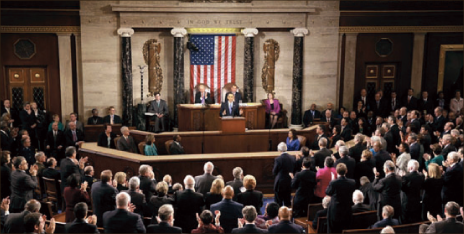State of the Union or state of confusion?


Progress — Obama’s latest address to the nation called for leaders to resolve their differences and compromise. whitehouse.gov
When President Barack Obama spoke to the country for his 2013 State of the Union address Tuesday, Feb. 12, it was hard not to think to yourself, “Same old, same old.”
In Obama’s speech, he touched on the topics we expected him to — from gun control to the budget — all the while stressing one theme that no one in politics seem to recognize anymore: compromise.
“The American people don’t expect government to solve every problem, and they don’t expect those of us in this chamber to agree on every issue,” Obama said. “But they do expect us to put the nation’s interests before party. They do expect us to forge reasonable compromise where we can, for they know that America moves forward only when we do so together, and that the responsibility of improving this union remains the task of us all.”
Obama continued his message of political togetherness, later adding that he would work to keep the government’s affairs more open to uphold the people’s faith in our country.
The president is correct in his assertion that compromise is needed. Congress, which is composed of the members of the House of Representatives and the Senate, has long lost its view on teamwork. A look at Congress’s official website shows that of the 100 members of the Senate, 70 percent vote with their party 90 percent of the time or more, with many of that 70 percent above the 98 percent mark.
During a December 2010 interview, current Speaker of the House of Representatives John Boehner said, “I reject the word compromise.”
In a 2012 interview with 60 Minutes, Senate Majority Leader Harry Reid was quick to rebuke Boehner’s comment, only to add later that “compromise is not what we do around here anymore.”
Well, thanks to their views, Congress has not passed a budget in nearly four years. Thanks to their views, Congress’s approval rating has dipped down to as low as 10 percent, and our country continues to add to its deficit of $16.5 trillion.
Congress has not always been this way. Former Kansas Sen. Bob Dole, who served as the Senate’s majority leader for two years and the minority leader for eight years, was widely viewed as a leader who pioneered progress across party lines. Numerous politicians have spoken about how Dole would tell congressional members to meet in his office and be prepared to work it out.
In a 2010 statement released through his spokesman, Dole said that sometimes people in Congress “fight you just to fight you,” rebuking Republicans for knee-jerk partisanship.
In the early ‘90s, President George H. W. Bush bargained with Democratic House and Senate members to pass a budget for the betterment of the country. Even Ronald Reagan, who in recent years has become the face of Tea Party members hoping for a return to conservative values, compromised with Democrats on Medicare issues.
These politicians knew what we have all figured out the hard way: that doing something, however small, is better than doing nothing.
A sad few politicians realize their incompetence, but many of them too late to make a difference.
“We should be individually and collectively embarrassed about our failures,” former Maine Sen. Olympia Snowe said. She stepped down from her position Jan. 3, citing uncontrollable partisanship and a dysfunctional Congress as the main reason for her decision.
Giving the same reasons, Evan Bayh, a senator from Indiana, also quit his position in 2010.
“Everything is so short-term politically tactical,” Bayh said in an interview with 60 Minutes. “It’s all about, ‘How do we win the next vote, the next election and the next news cycle?’”
Perhaps Obama’s declaration for his fellow politicians to come together was inspired by a speech given at the National Prayer Breakfast Feb. 7. Before Obama’s address at the event, renowned Johns Hopkins Hospital pediatric neurosurgeon Ben Carson, who spoke at Liberty University last March, bluntly discussed the government’s failings.
“We have all these Democratic lawyers and Republican lawyers, and they all want to win,” Carson said. “We need to get rid of that. What we need to think about is how to solve these problems.”
“I think particularly about ancient Rome,” Carson said. “Nobody could even challenge them militarily. They destroyed themselves from within, through moral decay and fiscal irresponsibility.”
As Christians, there are obviously some issues, such as abortion, that we should not compromise on. There is no excuse for sacrificing morality for the sake of agreement. Yet on topics that pertain more to our society — such as gun control, healthcare and the economy — vastly different opinions will be held, and agreements must be reached.
Obama began his State of the Union address with a quote from a 1962 John F. Kennedy speech: “The Constitution makes us not rivals for power, but partners for progress.”
I hope that Obama, Congress and we as a nation take those words to heart.
